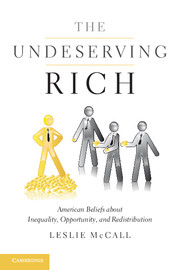Book contents
- Frontmatter
- Contents
- Tables and Figures
- Preface and Acknowledgments
- Introduction: Thinking about Income Inequality
- 1 Beyond the Opposition between Opportunity and Inequality
- 2 The Emergence of a New Social Issue
- 3 American Beliefs about Income Inequality
- 4 Why Do Americans Care about Income Inequality?
- 5 Americans' Social Policy Preferences in the Era of Rising Inequality
- Conclusion: A New Era of Beliefs about Inequality
- Notes
- References
- Index
2 - The Emergence of a New Social Issue
Media Coverage of Economic Inequality and Social Class in the United States, 1980–2010
Published online by Cambridge University Press: 05 April 2013
- Frontmatter
- Contents
- Tables and Figures
- Preface and Acknowledgments
- Introduction: Thinking about Income Inequality
- 1 Beyond the Opposition between Opportunity and Inequality
- 2 The Emergence of a New Social Issue
- 3 American Beliefs about Income Inequality
- 4 Why Do Americans Care about Income Inequality?
- 5 Americans' Social Policy Preferences in the Era of Rising Inequality
- Conclusion: A New Era of Beliefs about Inequality
- Notes
- References
- Index
Summary
The claim that Americans do not care about income inequality, and indeed the claim that they do, rests on a critical assumption: that they know enough about the issue to form an opinion about it. It is a tricky business to determine exactly how much information is enough to develop sensible ideas about an issue, but we can get a rough idea by comparing income inequality to issues that have a longer history of scrutiny by survey researchers. The premier example here is the state of the national economy. On this issue we expect Americans to have strong opinions, but we also expect them to have opinions that bear at least some resemblance to factual information, such as the unemployment or inflation rate. Not only are these statistics relatively easy to interpret, they are routinely reported by the news media as they rise and fall over the course of a business cycle. By contrast, we are wary of asking for opinions about the complicated details of specific legislation regarding tax policies or financial regulation. For these issues, the degree of economic literacy required to be politically engaged is generally quite a bit higher.
A set of issues that falls somewhere between these extremes is racial and gender inequality. On the one hand, Americans have biases when it comes to these topics, and their grasp of the underlying racial demographics of the United States is distorted. Yet, on the other hand, their opinions about policies related to racial and gender equality are likely to be informed by a vague sense that there has been considerable progress over the long run even as a lingering level of inequality remains.
- Type
- Chapter
- Information
- The Undeserving RichAmerican Beliefs about Inequality, Opportunity, and Redistribution, pp. 53 - 95Publisher: Cambridge University PressPrint publication year: 2013



